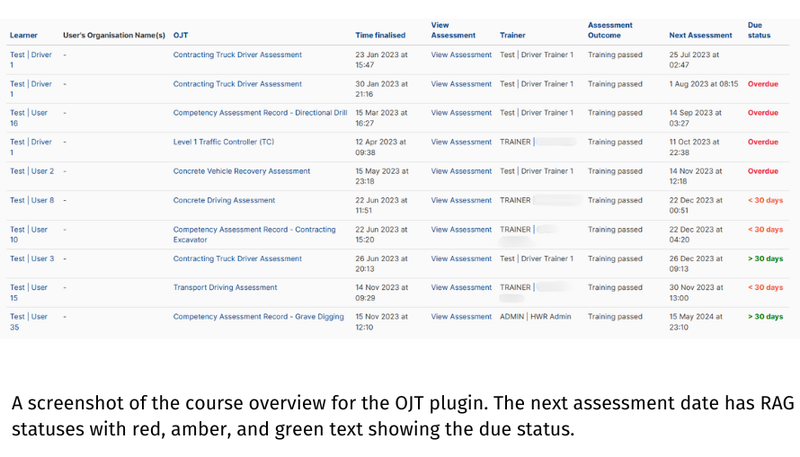 Catalyst IT specialises in free and open source technologies including Totara. We are experts in implementingand supporting the full range of Totara functions.
Catalyst IT specialises in free and open source technologies including Totara. We are experts in implementingand supporting the full range of Totara functions.
Managing assessments at scale is a challenge for any organisation. For NZ Police and H.W. Richardson Group (HWR), the process was manual, time-consuming, and paper-based—slowing down progress and limiting visibility into learner development.
Using Totara and the power of open source collaboration, the two organisations came together to build a better way.
The Challenge
NZ Police was managing thousands of on-the-job (OJT) assessments by hand. This created administrative bottlenecks, delays in tracking progress, and made it difficult to gain clear insights into learner performance. Similarly, HWR—one of New Zealand’s largest transport companies—was also relying on manual assessment processes, facing the same inefficiencies.
Both organisations were already using Totara. After connecting at a Totara User Group event, they saw an opportunity to tackle a shared challenge with a shared solution.
The Solution

Catalyst built on top of OJT’s functionality:
- Building the capability to add the date for the next assessment, enabling reoccurring qualifications. The date can be set as an automatic generic date or customised.
- Transforming the results from binary to granular options allowed them to add their preferred options to be presented to their learners. This change provides the learners with deeper insight into where they’re at in their learning journey.
- Updating the formatting on assessment pages to have a modern look. Carrying this formatting over to the printed version of the document made physical and digital options more accessible.
- Creating the option for learners to look over past work. This way, learners have access to their entire qualification history.
- Allowing site administrators to edit finalised evaluation dates. Now, an admin can update ‘next assessment’ dates if incorrectly entered.
- Expanding on the question types available on assessments. Instead of just text boxes and checklists, they added a scale users can choose from.
- Users can choose which assessments are reoccurring and which ones aren’t. When qualifications are set, managers are notified when they need to reset.
- Adding the ability to export reports as a CSV. This additional functionality allowed Police to have the data, including custom fields, in one file.
- Improving the plugin filters by being able to only show learners under ‘Evaluate students’. The filters improved the UX of the website and showed the managers only who they needed to see.
- Adding Red Amber Green (RAG) statuses to the next assessment date reporting. This update made it clear what assessments were upcoming as well as overdue.

Together with Totara Partner Catalyst, NZ Police and HWR co-developed an enhanced OJT plugin for Totara. Built on open source principles, the plugin was created through an iterative, user-driven process—with feedback from real trainers, administrators and learners shaping each stage of development.
Key features include:
Streamlined scheduling: Administrators can set recurring assessments, update dates, and receive alerts for upcoming evaluations.
Flexible formats: Assessments can include text fields, checklists, scaled evaluations and more—whatever works best for the training.
Real-time learner insights: Trainees and assessors can see progress at a glance, with personalised reporting that highlights development needs.
Red-Amber-Green (RAG) indicators: Visual status cues make it easy to spot overdue or upcoming tasks.
User-friendly reporting: Export reports in CSV format for easier analysis and compliance tracking.
Modern, accessible interface: Designed to work seamlessly across digital and print formats.
And because the solution is open source, it’s flexible, scalable and ready for future enhancements.
The Result
For NZ Police the plugin has transformed how they manage driving assessments—moving them entirely online and cutting down administrative overhead.
“The time saved is a huge benefit to our day-to-day operations, and the collaborative approach made this transition smooth and effective.”
— Ann-Marie Pickles, NZ Police
HWR also saw immediate impact. Since going live in December 2022, the digital shift has saved an estimated 1,480 hours of admin time—freeing up trainers to spend more time in the cab with drivers, and less time behind a desk.
“With the OJT activity customisations, we’ve provided real-time visibility for both drivers and managers. Catalyst worked closely with us to understand the complexities and deliver a solution that works.”
— Raechel Hunt, Learning and Development Coordinator, HWR
Built to benefit everyone
What started as a shared need between two organisations became a powerful open source project that now benefits the wider Totara community. It’s a clear example of how collaboration and openness can lead to smarter, more sustainable training solutions.

Raechel said “We provided case studies to Catalyst so the improvements could be fit for purpose. Catalyst took the time to fully understand the complexities of what was required and worked collaboratively with us to deliver a successful outcome.
Catalyst understood how important it was that the OJT needed to not be limited in its potential applications and worked with us to deliver on our requirements.
We were well supported through UAT trials and testing – and the changes that arose from these. The details, fixes, and tweaks added value to the final result.
Catalyst was with us all the way, ensuring the plugin was functional, easy to use, and worked for all parties involved – site administrators, trainers, managers, and the learners themselves.”
“We’ve successfully transitioned our assessments online, giving both drivers and managers real-time visibility. This shift has freed up valuable time for our driver trainers—saving approximately 1,480 hours since implementation.”
H.W. Richardson Group, Learning and Development Co‑ordinator






